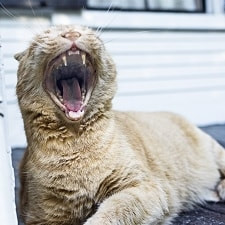Laurie Anne Walden, DVM Dental disease is very common in dogs and cats. Luckily, home dental care can help prevent painful tooth and gum conditions. Dogs and cats rarely get cavities. However, just like people, they develop gingivitis (inflammation of the gums) and periodontal disease (inflammation and infection of the structures that hold the teeth in place). According to the American Veterinary Dental College, periodontal disease is the most common disease diagnosed in adult dogs and cats. It causes bad breath, mouth pain, and tooth loss. It's also associated with heart, kidney, and liver problems. Because periodontal disease occurs under the gumline, you might not know your pet has the condition until it's advanced. Pets with unstained teeth and little tartar buildup can still have periodontal disease. The best way to prevent periodontal disease is to remove plaque daily at home and have the teeth professionally cleaned from time to time, just as you do with your own teeth. Professional dental cleanings for pets are performed under general anesthesia to allow removal of plaque and bacteria under the gums. (Simply scraping tartar off the visible tooth surfaces doesn't prevent gum disease.) Home dental care products If your pet has mouth pain or is bleeding from the gums, consult a veterinarian before beginning a home dental care program. Plaque removal can be painful for animals with existing oral disease unless it's done under anesthesia. When you're choosing oral hygiene products, look for the Veterinary Oral Health Council (VOHC) seal on the product packaging. The VOHC seal means that the product meets standards for effectiveness against plaque, tartar, or both. You can find lists of accepted products on the VOHC website. Tooth brushing is the standard way to remove plaque at home. Brushing daily or every other day has been shown to be significantly more effective than brushing once a week.[1] Use toothpaste formulated for pets, not for humans; it's safer for them to swallow. Here are two videos explaining the procedure in detail:
Medicated dental wipes are an alternative to toothbrushes. In addition to providing mechanical plaque removal, these products contain agents that slow plaque buildup. Oral dental gels contain antibacterial ingredients that improve breath odor and decrease plaque formation. If your reaction at this point is "I'm liable to lose a finger if I try to stick something in my pet's mouth," there are other options. Indirect dental care products can be reasonable alternatives, especially for animals that might bite. Dental diets are designed to abrade tooth surfaces during chewing. They work only on teeth in contact with the food. Dental chews and treats also mechanically remove plaque or tartar from teeth that they contact. Some chews are made of rawhide; others are soluble. Be aware that any of these products can pose a choking risk. Rigid products (like bones or hard nylon) may fracture teeth. Dr. Jan Bellows, a veterinary dental specialist, recommends these precautions[1]:
Water additives accepted by the VOHC inhibit the growth of bacteria in the mouth and reduce plaque and tartar buildup. Your pet doesn't have to have bad breath! Call the clinic if you have any questions about your pet's oral health. References 1. Harvey C, Serfilippi L, Barnvos D. Effect of frequency of brushing teeth on plaque and calculus accumulation, and gingivitis in dogs. J Vet Dent. 2015;32(1):16-21. doi:10.1177/089875641503200102 2. Bellows J. The ultimate guide to veterinary dental home care. DVM360. May 4, 2017. Accessed February 5, 2021. https://www.dvm360.com/view/ultimate-guide-veterinary-dental-home-care Photo by Ryan McGuire Comments are closed.
|
AuthorLaurie Anne Walden, DVM Categories
All
Archives
June 2024
The contents of this blog are for information only and should not substitute for advice from a veterinarian who has examined the animal. All blog content is copyrighted by Mallard Creek Animal Hospital and may not be copied, reproduced, transmitted, or distributed without permission.
|
- Home
- About
- Our Services
- Our Team
-
Client Education Center
- AKC: Spaying and Neutering your Puppy
- Animal Poison Control
- ASPCA Poisonous Plants
- AVMA: Spaying and Neutering your pet
- Biting Puppies
- Boarding Your Dog
- Caring for the Senior Cat
- Cats and Claws
- FDA warning - Bone treats
- Force Free Alliance of Charlotte Trainers
- Getting your Cat to the Vet - AAFP
- Holiday Hazards
- How To Feed Cats for Good Health
- How to Get the Most Out of your Annual Exam
- Indoor Cat Initiative - OSU
- Introducing Your Dog to Your Baby
- Moving Your Cat to a New Home
- Muzzle Training
- Osteoarthritis Checklist for Cats
- What To Do When You Find a Stray
- Our Online Store
- Dr. Walden's Blog
- Client Center
- Contact
- Cat Enrichment Month 2024
|
Office Hours
Monday through Friday 7:30 am to 6:00 pm
|
Mallard Creek Animal Hospital
2110 Ben Craig Dr. Suite 100
|
Site powered by Weebly. Managed by IDEXX Laboratories

 RSS Feed
RSS Feed